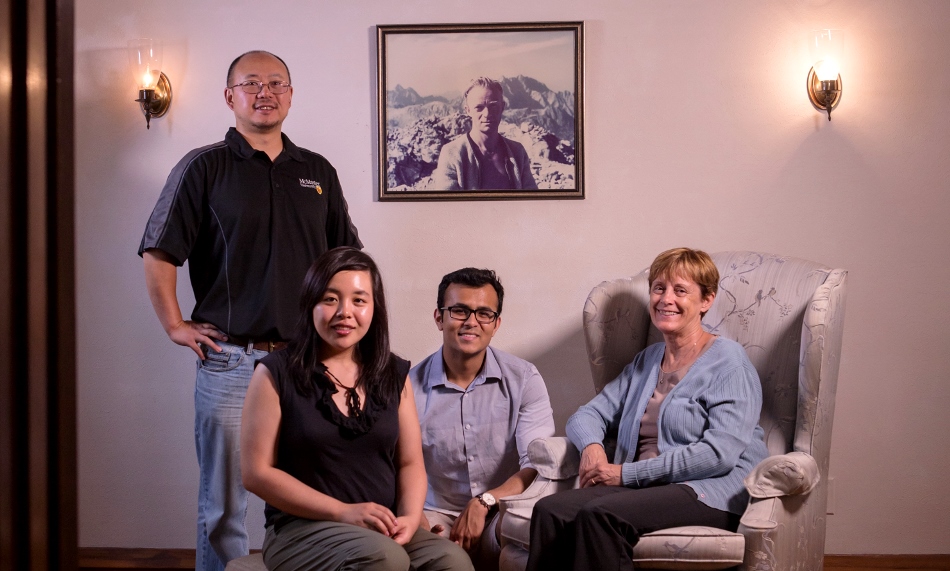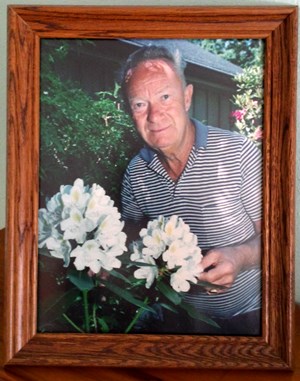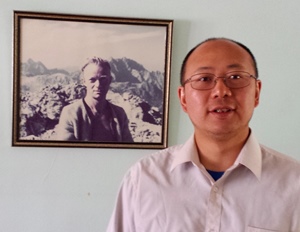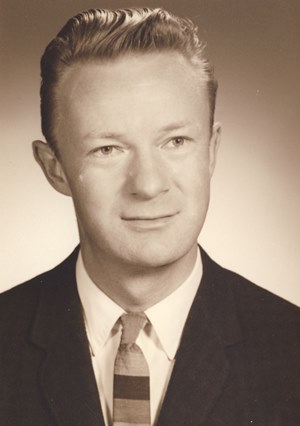Mac grad’s $1.8-million bequest includes his library, his scholarship fund – and his house

Portrait of the Mac grad as a young man – and four people who have been touched by the life of Ernest Kay ’47, ’49: (L. to R.) Qiyin Fang, who will lead a unique research project in Kay’s former home starting in 2017; Tiffany (Yuxin) Tian ’15 and Saad Syed ’16, who each received a scholarship in his name; and Priscilla Bayliss, his personal support worker.
BY Allyson Rowley
August 25, 2016
An empty house isn’t your usual place for a research lab.
“This will be a living laboratory,” says Qiyin Fang, Canada Research Chair in Biophotonics at McMaster. He will lead a unique research project in 2017, retrofitting the interior of the house to develop and test smart technology that will enable older people to live in their homes longer.

Located a block from main campus, the house was the family home of Ernest Kay ’47, ’49, who moved there with his parents in 1936. A lifelong supporter of his alma mater, Kay has left a bequest valued at more than $1.8 million, which includes his library collection, funds to augment a scholarship he established in 1999, and his two-storey Westdale home.
The interior of the house will be equipped with optical and ultrasound sensors to monitor the occupant’s physical activity and physiological parameters. The data collected from the state-of-the-art technology will be securely encrypted and owned by the patient, not an outside company.
“This is an opportunity to care more efficiently for the aging population and help them live more independently,” says Fang, an associate professor of engineering physics at McMaster, who anticipates the renovations will be completed and the research will be underway using volunteers in early 2017.
The initial goal of the project will be to develop technology to monitor older patients living with chronic diseases.
A living laboratory in a living room
The quaint character of the home – winding staircases, decorative moldings, and various nooks and crannies – will be left intact. In fact, that’s a significant asset to the research, which aims to replicate the real-life situation of someone living alone in his or her home. “We’re really unique,” says Fang. Rather than the usual fabricated research structure, “we actually have a 100-year-old house.”

As well as helping older patients to live more safely and independently in their own homes, the research project seeks to relieve the burden on family members and care givers, and reduce non-emergency visits to the hospital.
Fang points out that caring for an elderly parent nowadays can sometimes entail a longer time commitment than raising a child.
A joint research initiative of the Faculty of Engineering and the Faculty of Health Sciences, the project will be led by Fang as principal investigator, along with M. Jamal Deen, Senior Canada Research Chair in Information Technology and P. Ravi Selvaganapathy, Canada Research Chair in Biomicrofluidics. The renovations will be funded by a grant from the Canada Foundation for Innovation.
A life well lived
“Ernie would have loved this,” says Priscilla Bayliss, Kay’s friend and longtime caregiver. Kay took care of his elderly mother in their home for many years, and Bayliss cared for Kay during the last six years of his life. She was at his bedside in the hospital on the night he died.
“He loved people and he loved to laugh,” she recalls. “And he was very fond of McMaster.”
Kay’s donations to McMaster totaled more than $260,000 during his lifetime. In 1999, he established the Ernest Robert Mackenzie Kay Scholarship for biology, chemistry or biochemistry students who are heading to an advanced degree in medical research. To date, more than 70 students have benefited.
Tiffany (Yuxin) Tian ’15 and Saad Syed ’16 were two of those students.
Helping sleep-deprived students
For Tian, the scholarship not only meant financial support but also “mental support.” Working part-time during the school year and full-time in the summer, she was studying toward two McMaster degrees, a BSc in biochemistry and a BA in economics.
“I was constantly sacrificing my sleep,” she recalls. “The scholarship allowed me to take a break. It also allowed me to recharge and get ready for more challenges.” Tian is now working at McMaster, researching a potential medication for schizophrenia. She plans to apply to medical school to become a child psychiatrist or pediatrician.
A recent Mac graduate of the Arts & Science Program, Saad Syed credits the scholarship with helping him achieve his aspirations as a clinician-scientist. “It allowed me to invest a greater amount of time in my research,” says Syed, who is beginning the MD/PhD program at McMaster this fall. His PhD work will focus on the intersection of diet and environment. The larger research grant under which he is working is described in a recent Daily News story.
For the love of science
 Ernest Kay received his honours BSc in 1947, majoring in chemistry and biology, and his MA in 1949, both from McMaster. He went on to obtain a PhD in biochemistry from the University of Rochester in 1953.
Ernest Kay received his honours BSc in 1947, majoring in chemistry and biology, and his MA in 1949, both from McMaster. He went on to obtain a PhD in biochemistry from the University of Rochester in 1953.
The author of a biochemistry textbook, Kay held teaching and research positions at Acadia University, the University of Glasgow, Rockefeller University, Dalhousie University, and finally at the University of Toronto until his retirement in 1990. His areas of research included cancer biochemistry, cytochemistry, nucleic acids, chromatin, and nucleoproteins.
Some of his library collection has gone to the stacks and a few items went to the William Ready Division of Archives and Research Collections. Included in the archives are Kay’s memoirs which recount his extensive travels, such as a trip to a biochemistry congress in Moscow in 1961.
Fittingly, Kay’s memoirs acknowledge the importance of education. His parents were both teachers “who instilled in me the love of learning at an early age… My pleasure in the pursuit of science has been very much dependent on my contact with dedicated teachers all along the road.”
No matter where he was working or travelling, he maintained a lifelong connection to McMaster – “one of the gems in Westdale where my home was located.” Thanks to his bequest, generations of Mac students will follow in his footsteps and his home will be a hub of innovative research.
To learn more about including McMaster University in your will, contact Kelly Trickett in University Advancement at 905-525-9140, ext. 21990, or tricket@mcmaster.ca

